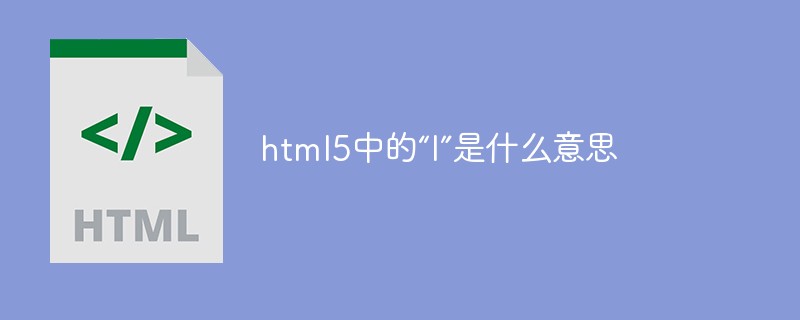What does 'l' mean in html5
The "l" in html5 means "language". html is the abbreviation of "Hyper Text Markup Language", which means hypertext markup language. "l" means Language; html It is a markup language that connects resources into a logical whole through tags. Hypertext is a way of organizing information. It associates text and graphics in the text with other information media through hyperlinks.

The operating environment of this tutorial: Windows 10 system, HTML5 version, Dell G3 computer.
What does "l" in html5 mean?
The "l" in html5 means Language, which is language.
html is the abbreviation of Hyper Text Markup Language.
The full name of HTML is hypertext markuplanguage, which is a markuplanguage. It includes a series of tags. These tags can unify the document format on the network and connect scattered Internet resources into a logical whole. HTML text is descriptive text composed of HTML commands. HTML commands can describe text, graphics, animations, sounds, tables, links, etc.
Hypertext is a way of organizing information that associates words and graphics in the text with other information media through hyperlinks. These interrelated information media may be in the same text, may be other files, or may be files on a computer that are geographically distant. This way of organizing information connects information resources distributed in different locations in a random manner, making it easier for people to find and retrieve information.
HTML tag
HTML markup tag is usually called HTML tag (HTML tag).
HTML tags are keywords surrounded by angle brackets, such as
HTML tags usually appear in pairs, such as and
The first tag in the tag pair is the opening tag and the second tag is the closing tag
The opening and closing tags are also known as open tags and closing tags
HTML document = web page
HTML document describes web page
HTML document contains HTML tags and plain text
HTML document is also called web page
Recommended tutorial: "html video tutorial"
The above is the detailed content of What does 'l' mean in html5. For more information, please follow other related articles on the PHP Chinese website!

Hot AI Tools

Undresser.AI Undress
AI-powered app for creating realistic nude photos

AI Clothes Remover
Online AI tool for removing clothes from photos.

Undress AI Tool
Undress images for free

Clothoff.io
AI clothes remover

Video Face Swap
Swap faces in any video effortlessly with our completely free AI face swap tool!

Hot Article

Hot Tools

Notepad++7.3.1
Easy-to-use and free code editor

SublimeText3 Chinese version
Chinese version, very easy to use

Zend Studio 13.0.1
Powerful PHP integrated development environment

Dreamweaver CS6
Visual web development tools

SublimeText3 Mac version
God-level code editing software (SublimeText3)

Hot Topics
 1662
1662
 14
14
 1419
1419
 52
52
 1313
1313
 25
25
 1262
1262
 29
29
 1235
1235
 24
24
 Table Border in HTML
Sep 04, 2024 pm 04:49 PM
Table Border in HTML
Sep 04, 2024 pm 04:49 PM
Guide to Table Border in HTML. Here we discuss multiple ways for defining table-border with examples of the Table Border in HTML.
 Nested Table in HTML
Sep 04, 2024 pm 04:49 PM
Nested Table in HTML
Sep 04, 2024 pm 04:49 PM
This is a guide to Nested Table in HTML. Here we discuss how to create a table within the table along with the respective examples.
 HTML margin-left
Sep 04, 2024 pm 04:48 PM
HTML margin-left
Sep 04, 2024 pm 04:48 PM
Guide to HTML margin-left. Here we discuss a brief overview on HTML margin-left and its Examples along with its Code Implementation.
 HTML Table Layout
Sep 04, 2024 pm 04:54 PM
HTML Table Layout
Sep 04, 2024 pm 04:54 PM
Guide to HTML Table Layout. Here we discuss the Values of HTML Table Layout along with the examples and outputs n detail.
 HTML Input Placeholder
Sep 04, 2024 pm 04:54 PM
HTML Input Placeholder
Sep 04, 2024 pm 04:54 PM
Guide to HTML Input Placeholder. Here we discuss the Examples of HTML Input Placeholder along with the codes and outputs.
 HTML Ordered List
Sep 04, 2024 pm 04:43 PM
HTML Ordered List
Sep 04, 2024 pm 04:43 PM
Guide to the HTML Ordered List. Here we also discuss introduction of HTML Ordered list and types along with their example respectively
 HTML onclick Button
Sep 04, 2024 pm 04:49 PM
HTML onclick Button
Sep 04, 2024 pm 04:49 PM
Guide to HTML onclick Button. Here we discuss their introduction, working, examples and onclick Event in various events respectively.
 Moving Text in HTML
Sep 04, 2024 pm 04:45 PM
Moving Text in HTML
Sep 04, 2024 pm 04:45 PM
Guide to Moving Text in HTML. Here we discuss an introduction, how marquee tag work with syntax and examples to implement.




